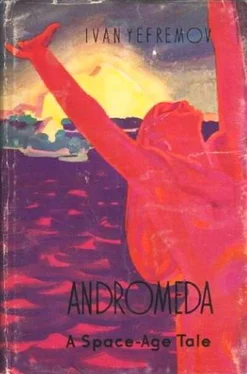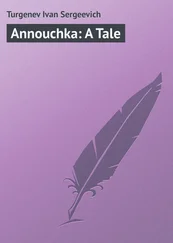Ivan Yefremov - Andromeda (A Space-Age Tale)
Здесь есть возможность читать онлайн «Ivan Yefremov - Andromeda (A Space-Age Tale)» весь текст электронной книги совершенно бесплатно (целиком полную версию без сокращений). В некоторых случаях можно слушать аудио, скачать через торрент в формате fb2 и присутствует краткое содержание. Город: Moscow, Год выпуска: 1959, Издательство: FOREIGN LANGUAGES PUBLISHING HOUSE, Жанр: Фантастика и фэнтези, на английском языке. Описание произведения, (предисловие) а так же отзывы посетителей доступны на портале библиотеки ЛибКат.
- Название:Andromeda (A Space-Age Tale)
- Автор:
- Издательство:FOREIGN LANGUAGES PUBLISHING HOUSE
- Жанр:
- Год:1959
- Город:Moscow
- ISBN:нет данных
- Рейтинг книги:5 / 5. Голосов: 1
-
Избранное:Добавить в избранное
- Отзывы:
-
Ваша оценка:
- 100
- 1
- 2
- 3
- 4
- 5
Andromeda (A Space-Age Tale): краткое содержание, описание и аннотация
Предлагаем к чтению аннотацию, описание, краткое содержание или предисловие (зависит от того, что написал сам автор книги «Andromeda (A Space-Age Tale)»). Если вы не нашли необходимую информацию о книге — напишите в комментариях, мы постараемся отыскать её.
Andromeda (A Space-Age Tale) — читать онлайн бесплатно полную книгу (весь текст) целиком
Ниже представлен текст книги, разбитый по страницам. Система сохранения места последней прочитанной страницы, позволяет с удобством читать онлайн бесплатно книгу «Andromeda (A Space-Age Tale)», без необходимости каждый раз заново искать на чём Вы остановились. Поставьте закладку, и сможете в любой момент перейти на страницу, на которой закончили чтение.
Интервал:
Закладка:
“We, the human race, have passed through many trials,” the voice of the teacher resounded with her excitement, “and the most important thing in your school history is the study of the historic mistakes made by man and their consequences. We have passed through the stage of the unbearable complication of life and things used by man and have arrived at extreme simplicity. The complication of life led dialectically to the simplification of spiritual culture. There must not be any unnecessary thing to tie man up, his experiences and perceptions are finer when he leads a simple life. Everything relating to everyday life is studied by the best brains as befits important scientific problems. We have followed the general line of development of the animal kingdom which was directed towards the liberation of attention by making movements automatic and developing reflexes in the work of the nervous system. The automation of the productive forces of society created an analogous reflex system of control in production economy and released many people for what is now man’s chief occupation — scientific research. Nature has provided us with a big brain capable of scientific inquiry although at first it was only used to search for food and investigate its edibility.”
“Very good!” whispered Evda Nahl and at that moment noticed her daughter. The girl did not suspect anything and sat staring in contemplation at the corrugated glass that prevented the pupils from seeing what was going on outside the classroom.
Veda Kong was curious to compare her with her mother. They had the same long straight hair, the daughter’s plaited with a blue thread and tied up in two big loops. Both had the same oval face, narrow at the chin and somewhat babyish from the too high forehead and the high cheekbones protruding below the temples. A snow-white sweater of artificial wool stressed the dark paleness of the girl’s skin and the acute blackness of her eyes, eyebrows and eyelashes. A necklace of red coral harmonized with the girl’s unquestionably original appearance.
Evda’s daughter, like all other pupils, wore wide shorts, hers differing only in a red fringe that was stitched into the seams.
“An American Indian ornament,” whispered Evda Nahl in answer to her friend’s inquiring glance.
Evda and Veda just had time to step back into the corridor when the teacher left the room followed by several pupils, Evda’s daughter amongst them. The girl stopped suddenly in her tracks as she noticed her mother, her pride and an example to be followed. Although Evda did not know it, there was a circle of her admirers in the school, youngsters who had decided to take the same road in life as she had taken.
“Mother!” whispered the girl, casting a shy glance at her mother’s companion and clinging to Evda.
The teacher stopped and then came over to them, giving them a nod of greeting.
“I must inform the school council,” she said, disregarding Evda’s gesture of protest, “we must gain something from your visit.”
“Better take advantage of her visit,” said Evda as she introduced Veda Kong.
The history teacher blushed deeply and looked like a young girl.
“That’s fine!” she said, trying to keep her tone businesslike. “The school is about to graduate the senior groups and a word from Evda Nahl to send them on their way coupled with a review of the ancient cultures and races from Veda Kong will be something for our youth to remember! Won’t it, Rhea?”
Evda’s daughter clapped her hands. The teacher ran with the light gait of a gymnast to the subsidiary premises, contained in a long straight building.
“Rhea, can you cut out the polytechnics lesson today and come for a walk?” Evda suggested to her daughter. “I shan’t be able to see you again before you have to choose your matriculation tasks. Last time we didn’t come to a decision.”
Rhea did not answer but took her mother’s hand. In each of the school cycles the lessons were interspersed with polytechnics. At the moment they were to have one of Rhea’s favourite occupations, the grinding of optical lenses, but what could be more interesting or more important than her mother’s arrival?
Veda went away to a little observatory that she could see in the distance, leaving mother and daughter alone. Rhea, clasping her mother’s strong arm like a child, walked beside her wrapped in thought.
“Where’s your little Kay?” asked Evda and the girl grew noticeably sad. Kay had been a ward of hers — the older school-children paid regular visits to first- and second cycle schools in their vicinity to help with the teaching and upbringing of wards they had selected. Integrated help for the teachers was absolutely essential to ensure thoroughness of education.
“Kay was promoted to the second cycle and has gone far away from here. It’s such a pity… why do they move us from place to place every four years, when we are promoted to the next cycle?”
‘“The psyche is wearied and becomes sluggish where there is a uniformity of impressions and perception becomes duller. The efficiency of teaching and upbringing grows less year by year. That is why the twelve years of schooling are divided into three four-year cycles and you move to another school after every cycle, each time to a different part of the planet. It is only the babies in the zero cycle, from one to four years, that do not need any change of place and conditions of upbringing.”
“And why does each cycle have separate schools and separate living quarters?”
"As you little people grow up and are trained you become qualitatively different beings. If different age groups live together it makes their training more difficult and is annoying to the youngsters themselves. We have reduced the differences to a minimum by dividing the children into three age groups, but this is still not a perfect system.
The first cycle, for example, obviously needs splitting into two groups, and that will soon be done. But let us talk first about your affairs and your dreams for the future. I shall have to deliver a lecture to all of you and may be able to answer your questions.”
Rhea began to confide her innermost thoughts to her mother with the frankness of a child of the Great Circle Era who had never experienced hurtful ridicule or misunderstanding. The girl was the incarnation of youth that as yet knew nothing of life but was full of contemplative anticipation. At the age of seventeen the girl was finishing school and starting her three-year period of matriculation tasks, working amongst adults. After the tasks her interests and abilities would be clearly defined. A two-year higher education would follow that would give her the right to independent work in the chosen field. In the course of a long life a man or woman had time to take higher educational courses in five or six different fields, changing work from time to time, but a great deal depended on the choice of the first difficult tasks — the Labours of Hercules, or matriculation tasks. They were chosen after long contemplation and always following the advice of older people.
“Have you passed the graduation psychological tests yet?” asked Evda.
“Yes. I got 20 and 24 in the first eight groups, 18 and 19 in the tenth and thirteenth and even 17 in the seventeenth!” exclaimed Rhea proudly.
“That’s wonderful!” said Evda in pleased tones. “Everything is open to you. Have you stuck to the choice you made for the first task?”
“Yes, I’m going to be a nurse on the Island of Oblivion, and then all our circle are going to work at the Jutland Psychological Hospital.”
Rhea told her mother about the circle of her “followers.” Evda had plenty of good-natured jokes to make about these zealous psychologists but nevertheless Rhea persuaded her mother to be mentor for the members of the group who were also at the time selecting their tasks.
Читать дальшеИнтервал:
Закладка:
Похожие книги на «Andromeda (A Space-Age Tale)»
Представляем Вашему вниманию похожие книги на «Andromeda (A Space-Age Tale)» списком для выбора. Мы отобрали схожую по названию и смыслу литературу в надежде предоставить читателям больше вариантов отыскать новые, интересные, ещё непрочитанные произведения.
Обсуждение, отзывы о книге «Andromeda (A Space-Age Tale)» и просто собственные мнения читателей. Оставьте ваши комментарии, напишите, что Вы думаете о произведении, его смысле или главных героях. Укажите что конкретно понравилось, а что нет, и почему Вы так считаете.











